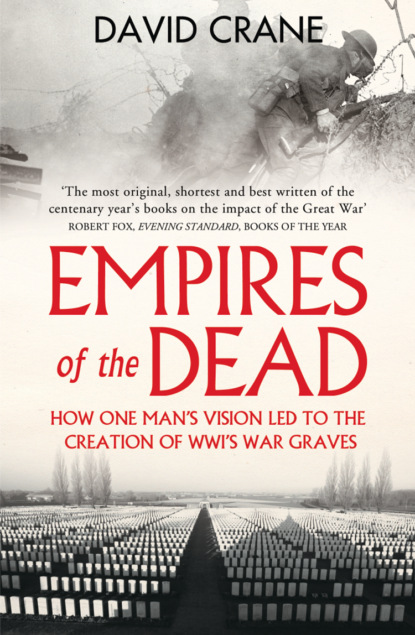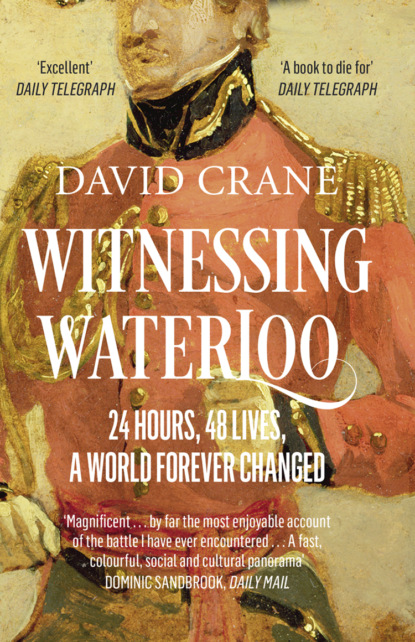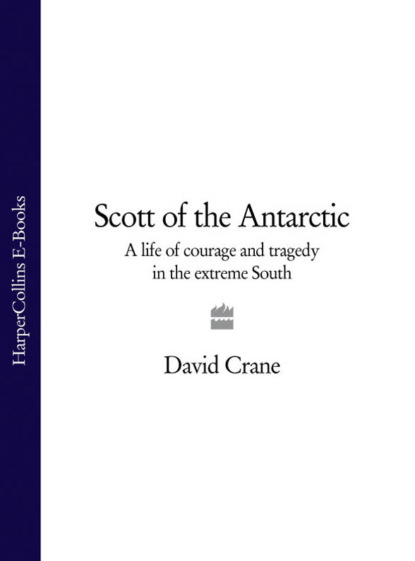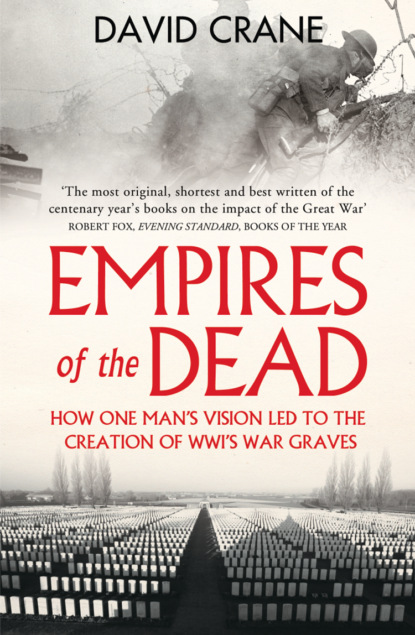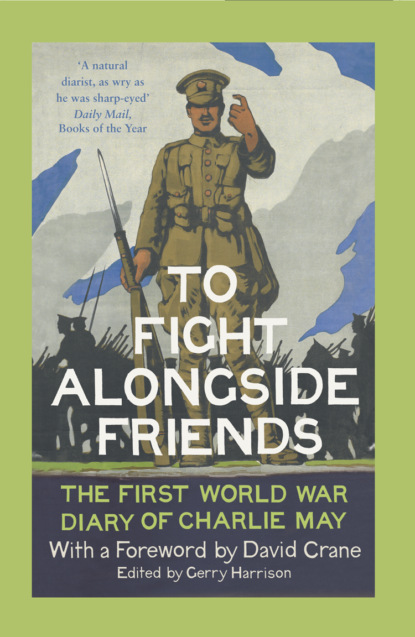Поиск:
Войти
Книги автора: David Crane
Сортировка
- сначала новые
- сначала новые
- по рейтингу
- по просмотрам
- по названию
‘There is a mad chap come here – whose name is Trelawny… He comes on the friend of Shelley, great, g…
‘There is a mad chap come here – whose name is Trelawny… He comes on the friend of Shelley, great, glowing, and rich in romance… But tell me who is this odd fish? They talk of him here as a camelion who went mad on reading Lord Byron’s ‘Corsair’.’ JOSEPH SEVERNDavid Crane’s brilliant first book investigates the life and phenomenon of Edward John Trelawny – writer, adventurer, romantic and friend to Shelley and Byron. Very reminiscent of YoungHusband in its mix of biography, history and travel writing it is a sparkling debut.Trelawny was, unquestionably, one of the great Victorians. He made a career from his friendship with Byron and Shelley and with his tales of glory from the Greek War of Independence. His story is one of betrayal and greed, of deluded idealism and physical courage played out against one of the most ferocious wars even the Balkans has seen.There has been no general biography of Trelawny for nearly twenty years, no history of the philhellene role in the Greek War of Independence for even longer.
Добавлено
Год выхода: 2018
Язык: Английский
Before WWI, little provision was made for the burial of the war dead. Soldiers were often unceremoni…
Before WWI, little provision was made for the burial of the war dead. Soldiers were often unceremoniously dumped in a mass grave; officers shipped home to be buried in local cemeteries.The great cemeteries of WWI came about as a result of the efforts of one inspired visionary. In 1914, Fabian Ware, at 45, was too old to enlist. Instead, he joined the Red Cross, working on the frontline in France. There he was horrified by the ignominious end to the lives of many of the soldiers who, buried hastily, were often lost as the battlelines moved backward and forward over the same ground. He recorded their identity and the position of their graves, and his work was quickly officially recognised, with a Graves Registration Commission being set up. As reports of their work became public, the Commission was flooded with letters from grieving relatives around the world.Critically acclaimed author David Crane gives a profoundly moving account of the creation of the great citadels to the dead, which involved leading figures of the day, including Kipling, Lutyens and Gertrude Jekyll. It is the story of both cynical political motivation, as governments sought to justify the sacrifices made, as well as the outpouring of great personal grief, following the ‘war to end all wars’.
Добавлено
Год выхода: 2019
Язык: Английский
Through the lives of three outstanding naval officers – each considered the most brilliant commander…
Through the lives of three outstanding naval officers – each considered the most brilliant commander of his generation – David Crane offers a unique portrait of the Royal Navy at a time when it held unchallenged dominion over the world's oceans.Although all three died young, their careers covered virtually every war of significance in which the navy was involved during the nineteenth century. They fought against French and Americans, Russians, Turks, Egyptians, Indians and Chinese, in fleet engagements and naval bombardments, on the walls of Canton and the banks of the Mississippi, against Malay pirates and sepoy mutineers.As an eleven-year-old volunteer, Frank Hastings saw action at Trafalgar, and he went on to be revered as a hero of the Greek War of Independence. Yet, as the architect and captain of the first successful steam warship and the champion of gunnery and total war, he unwittingly prepared the way for much that would be bloodiest in the century ahead.Nobody who saw him in the trenches of the Crimea would ever forget William Peel's air of inviolable self-mastery under fire, and it was the same in India, where he could ride through a landscape of decomposing corpses as if it were some mythological world conjured up to try his knightly resolve. What was it that enabled a man of his intelligence, temperament, piety and background to fight with such brilliance in defence of an Ottoman Empire that was repugnant to every tenet he held most strongly?If James Goodenough chased Glory as assiduously as Hastings and Peel had done, it was the Glory of the next world, and not this. Throughout his career he strove to reconcile the demands of his faith and his profession, but when he finally met his martyrdom at the hands of the 'savages' of the Pacific islands, a shocked nation was left to face up to the inconsistencies, hypocrisies and self-deceptions on which floated its vision of divine election.Combining thrilling scenes of battle with acute psychological insight, Men of War provides a remarkable picture of the nature of courage, command and warfare.Note that it has not been possible to include the same picture content that appeared in the original print version.
Добавлено
Год выхода: 2019
Язык: Английский
A groundbreaking work of Romantic biography; David Crane’s book is an astonishingly original examina…
A groundbreaking work of Romantic biography; David Crane’s book is an astonishingly original examination of Byron, and a radical approach to biography.Crane focuses on the lifelong feud between Augusta – Byron’s half-sister with whom he had a passionate affair – and Annabella, his society wife. Recreating a meeting between the two, years after Byron's death – the Romantic ‘High Noon’ – he explores the emotional and sexual truth and the human vulnerability that lie at the heart of the Byron story.‘The Kindness of Sisters’ is not only rigorous in its scholarship, but also superbly compelling drama. Crane’s book combines passion, revenge and recrimination in 19th-century Britain with all the intensity of a Greek tragedy.Note that it has not been possible to include the same picture content that appeared in the original print version.
Добавлено
Год выхода: 2019
Язык: Английский
[Previously published as ‘Went The Day Well’]A sweeping political, social, military and cultural ove…
[Previously published as ‘Went The Day Well’]A sweeping political, social, military and cultural overview of the United Kingdom on the eve, and then the day, of the greatest battle fought by British arms.Midnight, Sunday, 17 June 1815. There was no town in England that had not sent its soldiers, hardly a household that was not holding its breath, not a family, as Byron put it, that would escape ‘havoc’s tender mercies’ at Waterloo, and yet at the same time life inevitably went on as normal.As Wellington’s rain-sodden army retreated for the final, decisive battle, men and women in England were still going to the theatre and science lectures, still working in the fields and the factories, still reading and writing books and sermons, still painting their pictures and sitting in front of Lord Elgin’s marbles as if almost five thousand did not already lie dead. After ten hours of savage fighting, Waterloo would be littered with the bodies of something like 47,000 dead and wounded. Meanwhile, as the day unfolded, a whole nation, countryside and town, artisan and aristocrat, was brought together by war.From Samuel Johnson Prize shortlisted author David Crane, Went the Day Well is a breathtaking portrait of Britain in those moments. Moving from England to the battle and back again this vivid, stunning freeze-frame of a country on the single most celebrated day in its modern history shows Crane’s full range in tracing the endless, overlapping connections between people’s lives. From private tragedies, disappointed political hopes, and public discontents to grandiloquent public celebrations and monuments, it answers Wellington’s call as he rallied his troops to ‘Think what England is thinking of us now’.
Добавлено
Год выхода: 2019
Язык: Английский
David Crane has given us the definitive biography of one of Britain’s greatest heroes and explorers.…
David Crane has given us the definitive biography of one of Britain’s greatest heroes and explorers.‘It seems a pity, but I do not think I can write more…For God’s sake look after our people.’These were the final words written in Scott’s diary on 29 March 1912, as he lay dying in his tent with Birdie Bowers and Edward Wilson. Oates had taken himself into a blizzard a few days before, and the fifth member of the Polar party, Edgar Evans, had died some ten days previously, worn out by the cold and physical effort of the journey across Antarctica.Since then Scott has been the subject of many books – many hagiographical, others dismissive and scathing. Yet in all the pages that have been written about him, the personality behind the legend has been forgotten or distorted beyond all recognition.David Crane’s magisterial biography, based on years of close and detailed research with the original documents, redresses this completely. By reassessing Scott’s life and his substantial scientific achievements, Crane is able to provide a fresh and exciting perspective on both the Discovery expedition of 1901-4 and the Terra Nova expedition of 1910-12. The courage and tragedy of Scott’s last journey are only one part of the process, for the scientific enquiry that led up to it transformed the whole nature and ambition of Antarctic exploration.Scott’s own voice echoes through the pages. His descriptions of the monumental landscape of Antarctica in all its fatal and icy beauty are breathtaking; his honest, heartfelt letters and diaries give the reader an unforgettable account of the challenges he faced both in his personal life and as a superlative leader of men in possibly the harshest environment on the planet.Written with the full support of Scott’s surviving relatives, this definitive biography sets out to reconcile the very private struggles of the man with the very public life of extremes that he led.Note that it has not been possible to include the same picture content that appeared in the original print version.
Добавлено
Год выхода: 2018
Язык: Английский
Before WWI, little provision was made for the burial of the war dead. Soldiers were often unceremoni…
Before WWI, little provision was made for the burial of the war dead. Soldiers were often unceremoniously dumped in a mass grave; officers shipped home to be buried in local cemeteries.The great cemeteries of WWI came about as a result of the efforts of one inspired visionary. In 1914, Fabian Ware, at 45, was too old to enlist. Instead, he joined the Red Cross, working on the frontline in France. There he was horrified by the ignominious end to the lives of many of the soldiers who, buried hastily, were often lost as the battlelines moved backward and forward over the same ground. He recorded their identity and the position of their graves, and his work was quickly officially recognised, with a Graves Registration Commission being set up. As reports of their work became public, the Commission was flooded with letters from grieving relatives around the world.Critically acclaimed author David Crane gives a profoundly moving account of the creation of the great citadels to the dead, which involved leading figures of the day, including Kipling, Lutyens and Gertrude Jekyll. It is the story of both cynical political motivation, as governments sought to justify the sacrifices made, as well as the outpouring of great personal grief, following the ‘war to end all wars’.
‘There is a mad chap come here – whose name is Trelawny… He comes on the friend of Shelley, great, g…
‘There is a mad chap come here – whose name is Trelawny… He comes on the friend of Shelley, great, glowing, and rich in romance… But tell me who is this odd fish? They talk of him here as a camelion who went mad on reading Lord Byron’s ‘Corsair’.’ JOSEPH SEVERNDavid Crane’s brilliant first book investigates the life and phenomenon of Edward John Trelawny – writer, adventurer, romantic and friend to Shelley and Byron. Very reminiscent of YoungHusband in its mix of biography, history and travel writing it is a sparkling debut.Trelawny was, unquestionably, one of the great Victorians. He made a career from his friendship with Byron and Shelley and with his tales of glory from the Greek War of Independence. His story is one of betrayal and greed, of deluded idealism and physical courage played out against one of the most ferocious wars even the Balkans has seen.There has been no general biography of Trelawny for nearly twenty years, no history of the philhellene role in the Greek War of Independence for even longer.
Добавлено
Год выхода: 2019
Язык: Английский
Through the lives of three outstanding naval officers – each considered the most brilliant commander…
Through the lives of three outstanding naval officers – each considered the most brilliant commander of his generation – David Crane offers a unique portrait of the Royal Navy at a time when it held unchallenged dominion over the world's oceans.Although all three died young, their careers covered virtually every war of significance in which the navy was involved during the nineteenth century. They fought against French and Americans, Russians, Turks, Egyptians, Indians and Chinese, in fleet engagements and naval bombardments, on the walls of Canton and the banks of the Mississippi, against Malay pirates and sepoy mutineers.As an eleven-year-old volunteer, Frank Hastings saw action at Trafalgar, and he went on to be revered as a hero of the Greek War of Independence. Yet, as the architect and captain of the first successful steam warship and the champion of gunnery and total war, he unwittingly prepared the way for much that would be bloodiest in the century ahead.Nobody who saw him in the trenches of the Crimea would ever forget William Peel's air of inviolable self-mastery under fire, and it was the same in India, where he could ride through a landscape of decomposing corpses as if it were some mythological world conjured up to try his knightly resolve. What was it that enabled a man of his intelligence, temperament, piety and background to fight with such brilliance in defence of an Ottoman Empire that was repugnant to every tenet he held most strongly?If James Goodenough chased Glory as assiduously as Hastings and Peel had done, it was the Glory of the next world, and not this. Throughout his career he strove to reconcile the demands of his faith and his profession, but when he finally met his martyrdom at the hands of the 'savages' of the Pacific islands, a shocked nation was left to face up to the inconsistencies, hypocrisies and self-deceptions on which floated its vision of divine election.Combining thrilling scenes of battle with acute psychological insight, Men of War provides a remarkable picture of the nature of courage, command and warfare.Note that it has not been possible to include the same picture content that appeared in the original print version.
Добавлено
Год выхода: 2019
Язык: Английский
A groundbreaking work of Romantic biography; David Crane’s book is an astonishingly original examina…
A groundbreaking work of Romantic biography; David Crane’s book is an astonishingly original examination of Byron, and a radical approach to biography.Crane focuses on the lifelong feud between Augusta – Byron’s half-sister with whom he had a passionate affair – and Annabella, his society wife. Recreating a meeting between the two, years after Byron's death – the Romantic ‘High Noon’ – he explores the emotional and sexual truth and the human vulnerability that lie at the heart of the Byron story.‘The Kindness of Sisters’ is not only rigorous in its scholarship, but also superbly compelling drama. Crane’s book combines passion, revenge and recrimination in 19th-century Britain with all the intensity of a Greek tragedy.Note that it has not been possible to include the same picture content that appeared in the original print version.
Добавлено
Год выхода: 2019
Язык: Английский
‘I do not want to die. The thought that we may be cut off from each other is so terrible and that ou…
‘I do not want to die. The thought that we may be cut off from each other is so terrible and that our babe may grow up without my knowing her and without her knowing me. It is difficult to face. Know through all your life that I loved you and baby with all my heart and soul, that you two sweet things were just all the world to me’Captain Charlie May was killed, aged 27, in the early morning of 1st July 1916, leading the men of ‘B Company’, 22nd Manchester Service Battalion (the Manchester Pals) into action on the first day of the Somme.This tolerant and immensely likeable man had been born in New Zealand and – against King’s regulations – he kept a diary in seven small, wallet-sized pocket books. A journalist before the war and a born storyteller, May’s diaries give a vivid picture of battalion life in and behind the trenches during the build-up to the greatest battle fought by a British army and are filled with the friendships and tensions, the home-sickness, frustrations, delays and endless postponements, the fog of ignorance, the combination of boredom and terror to which every man that has ever fought could testify.His diaries reflect on the progress of the war, tell jokes – good and bad, give details of horse-rides along the Somme valley, afternoons with a fishing rod, lunch in Amiens, a gastronomic celebration of Christmas 1915 and concerts in ‘Whiz Bang Hall’. He describes battles not just with the enemy, but with rats, crows and on the makeshift football pitch – all recorded with a freshness that brings these stories home as if for the first time.The diaries are also written as an extended and deeply-moving love letter to his wife Maude and baby daughter Pauline. ‘I do not want to die’, he wrote – ‘Not that I mind for myself. If it be that I am to go, I am ready. But the thought that I may never see you or our darling baby again turns my bowels to water.’Fresh, eloquent and warm, these diaries were kept secret from the censor and were delivered to his wife after his death by a fellow soldier in Charlie’s company. Edited by his great-nephew and published for the first time, these diaries give an unforgettable account of the war that took Charlie May’s life, and millions of others like him.
Добавлено
Год выхода: 2019
Язык: Английский
[Previously published as ‘Went The Day Well’]A sweeping political, social, military and cultural ove…
[Previously published as ‘Went The Day Well’]A sweeping political, social, military and cultural overview of the United Kingdom on the eve, and then the day, of the greatest battle fought by British arms.Midnight, Sunday, 17 June 1815. There was no town in England that had not sent its soldiers, hardly a household that was not holding its breath, not a family, as Byron put it, that would escape ‘havoc’s tender mercies’ at Waterloo, and yet at the same time life inevitably went on as normal.As Wellington’s rain-sodden army retreated for the final, decisive battle, men and women in England were still going to the theatre and science lectures, still working in the fields and the factories, still reading and writing books and sermons, still painting their pictures and sitting in front of Lord Elgin’s marbles as if almost five thousand did not already lie dead. After ten hours of savage fighting, Waterloo would be littered with the bodies of something like 47,000 dead and wounded. Meanwhile, as the day unfolded, a whole nation, countryside and town, artisan and aristocrat, was brought together by war.From Samuel Johnson Prize shortlisted author David Crane, Went the Day Well is a breathtaking portrait of Britain in those moments. Moving from England to the battle and back again this vivid, stunning freeze-frame of a country on the single most celebrated day in its modern history shows Crane’s full range in tracing the endless, overlapping connections between people’s lives. From private tragedies, disappointed political hopes, and public discontents to grandiloquent public celebrations and monuments, it answers Wellington’s call as he rallied his troops to ‘Think what England is thinking of us now’.
Добавлено
Год выхода: 2019
Язык: Английский
David Crane has given us the definitive biography of one of Britain’s greatest heroes and explorers.…
David Crane has given us the definitive biography of one of Britain’s greatest heroes and explorers.‘It seems a pity, but I do not think I can write more…For God’s sake look after our people.’These were the final words written in Scott’s diary on 29 March 1912, as he lay dying in his tent with Birdie Bowers and Edward Wilson. Oates had taken himself into a blizzard a few days before, and the fifth member of the Polar party, Edgar Evans, had died some ten days previously, worn out by the cold and physical effort of the journey across Antarctica.Since then Scott has been the subject of many books – many hagiographical, others dismissive and scathing. Yet in all the pages that have been written about him, the personality behind the legend has been forgotten or distorted beyond all recognition.David Crane’s magisterial biography, based on years of close and detailed research with the original documents, redresses this completely. By reassessing Scott’s life and his substantial scientific achievements, Crane is able to provide a fresh and exciting perspective on both the Discovery expedition of 1901-4 and the Terra Nova expedition of 1910-12. The courage and tragedy of Scott’s last journey are only one part of the process, for the scientific enquiry that led up to it transformed the whole nature and ambition of Antarctic exploration.Scott’s own voice echoes through the pages. His descriptions of the monumental landscape of Antarctica in all its fatal and icy beauty are breathtaking; his honest, heartfelt letters and diaries give the reader an unforgettable account of the challenges he faced both in his personal life and as a superlative leader of men in possibly the harshest environment on the planet.Written with the full support of Scott’s surviving relatives, this definitive biography sets out to reconcile the very private struggles of the man with the very public life of extremes that he led.Note that it has not been possible to include the same picture content that appeared in the original print version.
Добавлено
Год выхода: 2018
Язык: Английский
Before WWI, little provision was made for the burial of the war dead. Soldiers were often unceremoni…
Before WWI, little provision was made for the burial of the war dead. Soldiers were often unceremoniously dumped in a mass grave; officers shipped home to be buried in local cemeteries.The great cemeteries of WWI came about as a result of the efforts of one inspired visionary. In 1914, Fabian Ware, at 45, was too old to enlist. Instead, he joined the Red Cross, working on the frontline in France. There he was horrified by the ignominious end to the lives of many of the soldiers who, buried hastily, were often lost as the battlelines moved backward and forward over the same ground. He recorded their identity and the position of their graves, and his work was quickly officially recognised, with a Graves Registration Commission being set up. As reports of their work became public, the Commission was flooded with letters from grieving relatives around the world.Critically acclaimed author David Crane gives a profoundly moving account of the creation of the great citadels to the dead, which involved leading figures of the day, including Kipling, Lutyens and Gertrude Jekyll. It is the story of both cynical political motivation, as governments sought to justify the sacrifices made, as well as the outpouring of great personal grief, following the ‘war to end all wars’.
Добавлено
Год выхода: 2018
Язык: Английский
Before WWI, little provision was made for the burial of the war dead. Soldiers were often unceremoni…
Before WWI, little provision was made for the burial of the war dead. Soldiers were often unceremoniously dumped in a mass grave; officers shipped home to be buried in local cemeteries.The great cemeteries of WWI came about as a result of the efforts of one inspired visionary. In 1914, Fabian Ware, at 45, was too old to enlist. Instead, he joined the Red Cross, working on the frontline in France. There he was horrified by the ignominious end to the lives of many of the soldiers who, buried hastily, were often lost as the battlelines moved backward and forward over the same ground. He recorded their identity and the position of their graves, and his work was quickly officially recognised, with a Graves Registration Commission being set up. As reports of their work became public, the Commission was flooded with letters from grieving relatives around the world.Critically acclaimed author David Crane gives a profoundly moving account of the creation of the great citadels to the dead, which involved leading figures of the day, including Kipling, Lutyens and Gertrude Jekyll. It is the story of both cynical political motivation, as governments sought to justify the sacrifices made, as well as the outpouring of great personal grief, following the ‘war to end all wars’.
1
Популярные книги





